#hymn herder
Text


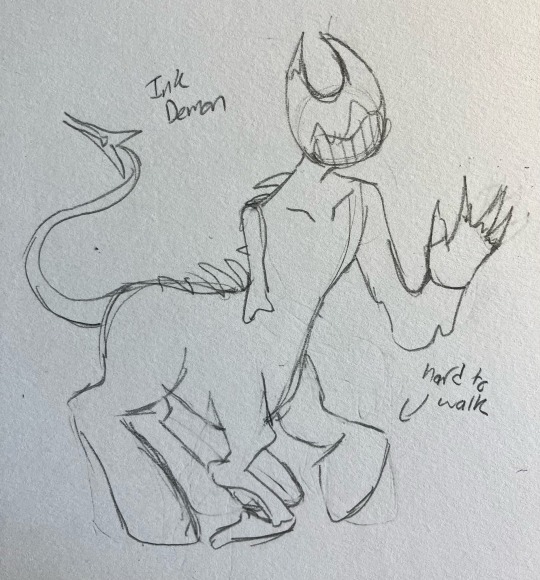


heres the mlp au toons! plus an ink sam who you will see more of in another post
#victors art#alice angel#alice alicorn#bendy the dancing demon#bendy the centaur#boris the wolf#boris the diamond dog#ink demon#sammy lawrence#hymn herder#batim mlp au#bendy and the ink machine#batdr#(for the second ink demon design)
33 notes
·
View notes
Text
★ Hekate's Deipnon ★

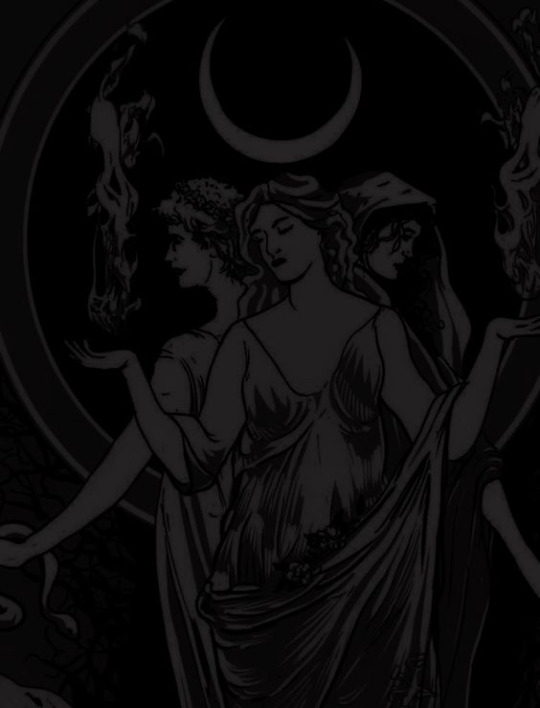

WHAT IS HEKATE'S DEIPNON?
Hekate's Deipnon (or Hekate's Supper), at its most basic, is described as a religious offering meal given to Hekate and the restless dead once every lunar month on the new moon.
However, there is more to the event than just that.
The Deipnon itself contains about two events; the ritual purification (Oxuthumia) and the actual supper (Deipnon). As well as this, many modern polytheists will also do a physical cleaning of the house and ending things that were started the previous month (such as paying off bills, finishing projects, etc.).
OXUTHUMIA
Oxuthumia is the ritual purification of the home before the actual Deipnon.
This purification can include;
cleansing via smoke/incense
sweeping the home
physical cleaning and decluttering
cleaning of any altars/shrines
Many like to include house sweepings in the main offering for the Deipnon, so be sure to save them for that if you want!
THE DEIPNON
The Deipnon itself is the act of giving offerings to Hekate and the restless dead, usually at the crossroads, on the night of the new moon.
Traditionally this was done at some form of crossroads, but if you cannot do this outside for any reason, the offering can be left at the altar.
Usually, the offering consists of:
garlic or leek
a liquid libation, whether wine, honey, water, etc.
eggs
house sweepings (from the Oxuthumia)
You may be wondering, who are the restless dead?
The restless dead are essentially people who have died and not received a proper burial, died violently, or died prematurely. These are what you may see be called 'ghosts'.
One superstition about the Deipnon is, "once you give the offerings at the crossroads, walk back home and don't look back or you may see the restless dead, giving you bad luck". (unfortunately I cant find where I read this, so please take it with a grain of salt).
OTHER WAYS TO CELEBRATE
paying off all bills that need paying
paying off other debts, financial or otherwise
giving thanks or offerings to deities you forgot to during the past month
finishing projects
cleaning or other housework
writing out thank you cards, notes, etc.
getting rid of things no longer needed/wanted
emptying your Kathistkos, if you have one.
EXTRAS
Orphic Hymn to Hekate
translation by Apostolos N. Athanassakis, Benjamin M. Wolkow
Lovely Hekate of the roads
and of the crossroads I invoke.
In heaven, on earth,
then is sea, saffron-cloaked,
tomb spirit reveling
in the souls of the dead,
daughter of Perses, haunting deserted places
delighting in deer,
nocturnal, dog-loving,
monstrous queen,
devouring wild beasts,
ungirt and repulsive.
Herder of bulls,
queen and mistress of the whole world,
leader, nymph,
mountain-roaming nurturer of youths,
maiden, I beseech you to come
to these holy rites,
ever with joyous heart,
ever favoring the oxherd.
SOURCES
Circle for Hekate - Volume I by Sorita D'Este
Hekate: Her Sacred Fires by Sorita d’Este, Raven Digitalis, Vikki Bramshaw
Hekate Liminal Rites by Sorita d’Este, David Rankine
#🏛️ : helpol#🏺 : theoi#hekate#hekate's deipnon#deipnon#hellenic deities#hellenic pagan#hellenic polytheism
31 notes
·
View notes
Text
Deutschribing Germany
Literature
Middle Ages (5th-15th centuries)
Medieval German literature can be divided into two periods: Old High German literature (8th-11th centuries) and Middle High German literature (12th-14th centuries). The only surviving works from the first period are the Hildebrandslied (Lay of Hildebrand), which is the earliest poetic text in German and tells of the tragic encounter in battle between a father and a son, and Muspilli, which deals with the fate of the soul after death and at the Last Judgment.
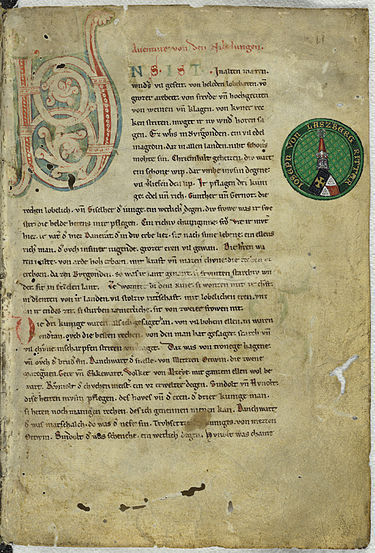
Middle High German literature saw a 60-year golden age known as mittelhochdeutsche Blütezeit, in which lyric poetry in the form of Minnesang—the German version of courtly love—blossomed thanks to poets such as Walther von der Vogelweide and Wolfram von Eschenbach. Another important genre during this time was epic poetry, of which the most famous example is the Nibelungenlied (The Song of the Nibelungs), which narrates the story of prince Siegfried and princess Kriemhild, among other characters.
Renaissance (15th-16th centuries)
Early New High German literature includes works such as Der Ring (The Ring) by Heinrich Wittenwiler, a 9,699-line satirical poem where each line is marked with red or green ink depending on the seriousness of the material, and Das Narrenschiff (Ship of Fools) by Sebastian Brant, a satirical allegory that contains the ship of fools trope.
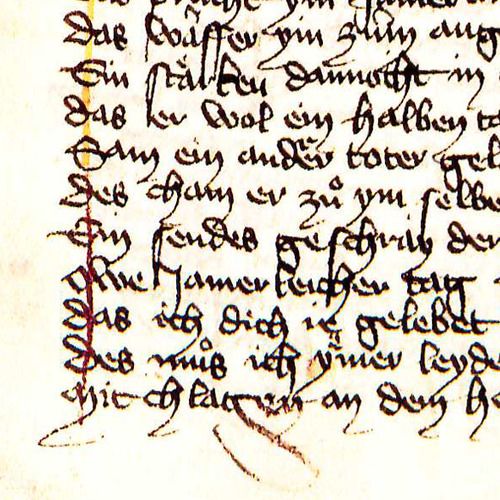
Other important authors are satirist and poet Thomas Murner, humanist Sebastian Franck, and poets Johannes von Tepl and Oswald von Wolkenstein.
Baroque (16th-17th centuries)
The Baroque period is characterized by works that reflected the experiences of the Thirty Years’ War and tragedies (Trauerspiele) on Classical themes, the latter were written by authors such as Andreas Gryphius and Daniel Caspar von Lohenstein. The most famous work is Der abenteuerliche Simplicissimus (Simplicius Simplicissimus) by Hans Jakob Christoffel von Grimmelshausen, a picaresque novel that narrates the adventures of the naïve Simplicissimus.
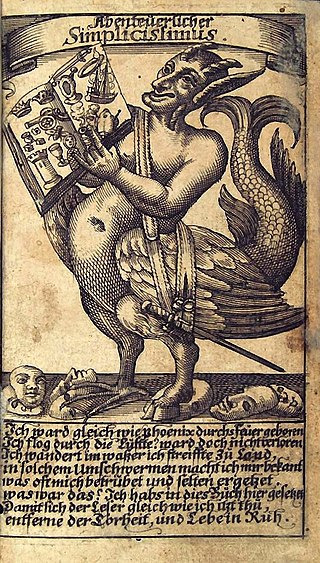
Enlightenment (17th-18th centuries)
The most important writers of the Enlightenment are Christian Felix Weiße, Christoph Martin Wieland, Gotthold Ephraim Lessing, and Johann Gottfried Herder.
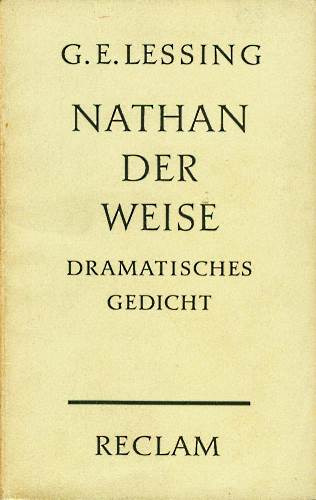
The Age of Reason saw the emergence of two literary movements: Empfindsamkeit (sentimental style) and Sturm und Drang (storm and stress). The first one intended to express true and natural feelings and featured sudden mood changes. The latter movement was characterized by individual subjectivity and extremes of emotion in response to the rationalism imposed by the Enlightenment.
Weimar Classicism (18th-19th centuries)
The main drivers behind Weimar Classicism, which synthesized ideas from Classicism, the Enlightenment, and Romanticism, were Johann Christoph Friedrich von Schiller, and Johann Wolfgang von Goethe.
During this period, Schiller published Die Bürgschaft (The Pledge), a ballad based on the legend of Damon and Pythias found in the Latin Fabulae, and Don Karlos (Don Carlos), a historical tragedy about Carlos, Prince of Asturias, while Goethe wrote Egmont, a play heavily influenced by Shakespearean tragedy, and Faust, a tragic play in which the main character sells his soul to the devil that is considered the greatest work of German literature.
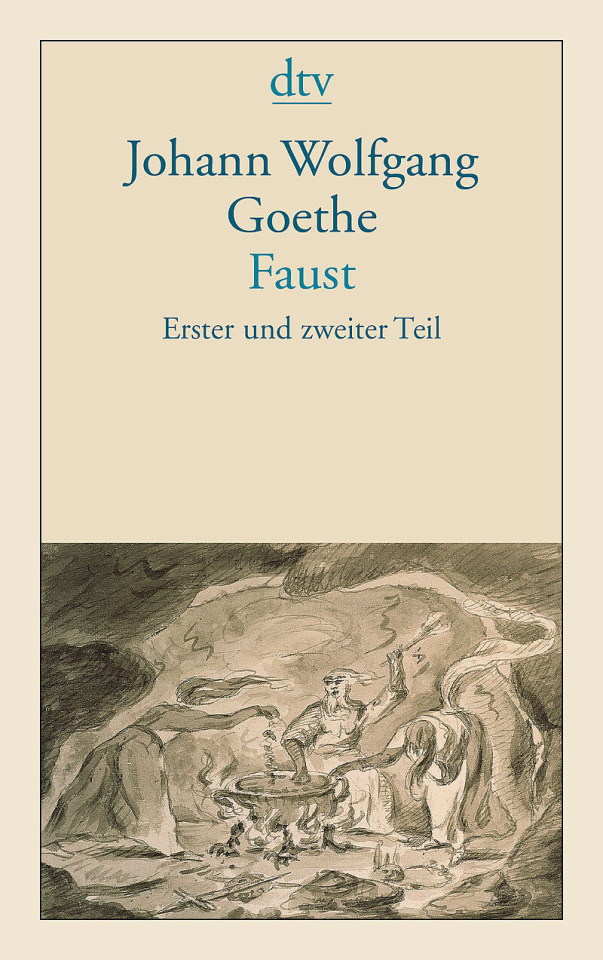
Romanticism (18th-19th centuries)
Important Romantic writers include E. T. A. Hoffmann, author of Der Sandmann (The Sandman), a short story based on the mythical character of said name that puts people to sleep by sprinkling sand on their eyes; Heinrich von Kleist, who wrote Das Kätchen von Heilbronn (The Little Catherine of Heilbronn), a drama set in Swabia in the Middle Ages; Joseph Freiherr von Eichendorff, author of Das Marmorbild (The Marble Statue), a novella about a man who struggles to choose between piety and a world of art, and Novalis, author of Hymnen an die Nacht (Hymns to the Night), a collection of six poems.
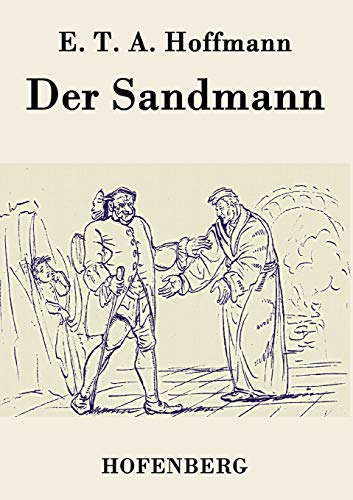
Folk tales collected by the Brothers Grimm became very popular during the Romantic period, as they represented a pure form of national literature and culture.
Biedermeier and Young Germany (19th century)
The Biedermeier period contrasts with the Romantic era and is best exemplified by poets Adelbert von Chamisso, Annette von Droste-Hülshoff, and Wilhelm Müller.
Young Germany was a youth movement whose main proponents were Karl Gutzkow, Ludolf Wienbarg, and Theodor Mundt.
Realism and Naturalism (19th century)
The most representatives realist authors are Gustav Freytag, Theodor Fontane, and Theodor Storm, while Gerhart Hauptmann was the most important naturalist writer.
Weimar literature (20th century)
During the Weimar Republic, writers such as Erich Maria Remarque, Heinrich Mann, and Thomas Mann presented a bleak look at the world and the failure of politics and society.
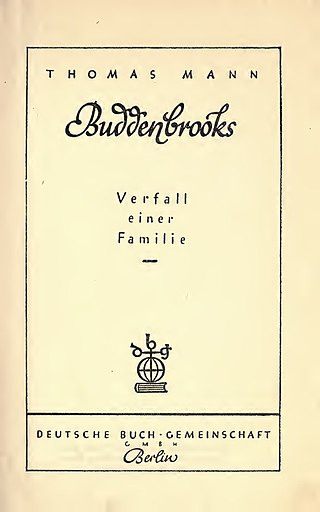
Expressionism (20th century)
As a modernist movement, Expressionism presented the world solely from a subjective perspective, distorting it for emotional effect. Famous authors include novelists Alfred Döblin and Franz Kafka, playwrights Ernst Toller and Georg Kaiser, and poets August Stramm and Else Lasker-Schüler.
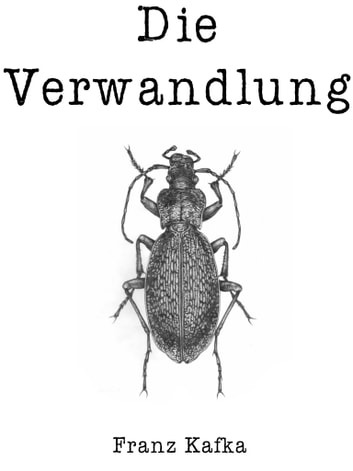
Neue Sachlichkeit (20th century)
Neue Sachlichkeit (New Objectivity) arose as a reaction against expressionism and was characterized by its political perspective on reality and portrayal of dystopias in an emotionless reporting style, showing cynicism about humanity. Authors associated with this movement include Erich Kästner, Hans Fallada, and Irmgard Keun.
Nazi Germany (1933-1945)
During the Nazi regime, some authors went into exile, while others submitted to censorship. The former, who either were of Jewish ancestry or opposed the regime for political reasons, include writers Alice Rühle-Gerstel and Anna Seghers, playwright Bertolt Brecht, and poet and novelist Hermann Hesse/Emil Sinclair.
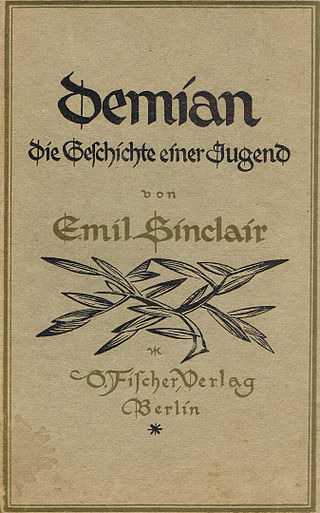
Those who stayed and engaged in inner emigration include writer Friedrich Reck-Malleczewen, poet and essayist Gottfried Benn, writer Hans Blüher, and poet and novelist Ricarda Huch.
Post-war literature (20th century)
The most famous authors in West Germany were Edgar Hilsenrath, Günter Grass, Heinrich Böll, and Group 47, a group of participants in writers’ meetings invited by Hans Werner Richter.
East German writers include Christa Wolf, Heiner Müller, Reiner Kunze, and Sarah Kirsch.
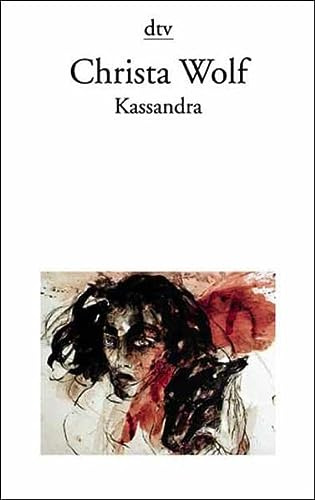
Contemporary literature (21st century)
Fantasy and science fiction authors include Andreas Eschbach, Frank Schätzing, and Wolfgang Hohlbein. Some of the most important poets are Aldona Gustas, Hans Magnus Enzensberger, and Jürgen Becker. Thriller is best represented by Ingrid Noll. Fiction novelists include Herta Müller, Siegfried Lenz, and Wilhelm Genazino.
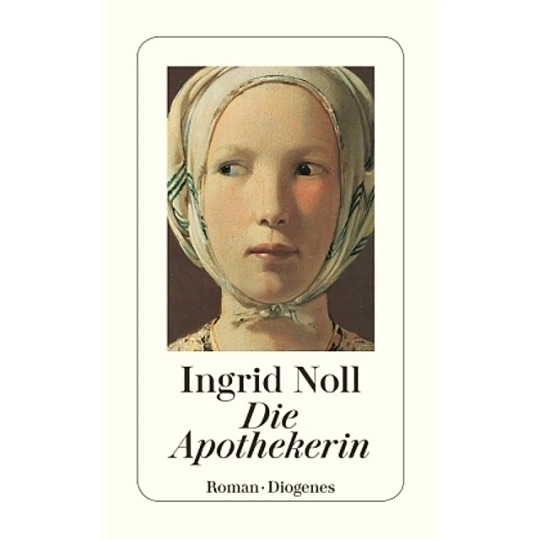
20 notes
·
View notes
Text
Karelian words - Church
Alliluija - hallelujah
Altari - altar
Altariabuniekka - sexton (office)
Altaristola, pyhästola - altar table
Ambona - ambon, ambo
Amin, ämmin - amen
Anheli - angel
Antifona - antiphon
Antihristu - antichrist
Antiminssi, pyhästolanpaikka - antimins
Apostola - apostate
Arbaituspagin - allegory
Arhimandriitta - archimandrite
Arhijepiskoppu - archbishop
Biblii - the Bible
Blahvešen’n’a - Feast of the Annunciation to the Blessed Virgin Mary
Bohorodičča - Theotokos, Mother of God, title of Mary mother of Jesus
Bokku-ukset, diakonin ukset - doors of deacon
Časouna - eukterion
Diakona - deacon
Dikiri, Trikiri - dikirion and trikirion
Dogma - dogma
Dogmatiekka - Dogmatic theology, dogmatics
Ektenii - ectenia
Ekumenii - ecumenism
Epigonaatio, pualičča - epigonation, palitza
Epistolu - epistle
Epitrakiili - epitrachelion
Evangelii - the gospel, the Christian message
Evangelista - diciple of Jesus
Evangeliikniigu - book that includes only the canonical gospels: Matthew, Mark, Luke and John.
Ezipaimoi - "first, foremost shepherd", refers to priests work as herder to the souls of his congregation, as well as that of Jesus to Christians
Gimnugruafii - hymnography, specifically eastern orthodox hymnology
Feloni - phelonion
Muahpanendu, kalmuandu - burial
Sroičču, Sroičanpäivy - Pentecost
Harhaoppi - herecy
Hora - choir
Hospodi - the Lord, referring to the Christian God
Iisus - Jesus
Iguumen - hegumen, head of a monastery in the Eastern Orthodox and Eastern Catholic Churches, similar to the title of abbot.
Iguumen’n’a - hegumenia, head of a nun monastery in the Eastern Orthodox and Eastern Catholic Churches, similar to the title of abbess.
Suuri ruado, Kummanruado - miracle
Iikossi - Icos, a church hymn that praises and glorifies the honored saint and church event.
Obraza - icon
Ikonokluazma, Obrazukluazma - Iconoclasm
Ikonostuazi, Obrazuseiny - Iconostasis
Iänenkandai - prophet
Jepiskoppa - bishop
Jiävindy - epiphany
Roštuo, rastavu, raštava - Christmas
Jumal - god, especially Christian God
Kirikkösluužba - Church service, worship
Emänpäivä - Feast of Dormition of the Mother of God
Bogorodičča, Neičyt Marian roindupruazniekka - Feast of the Nativity of the Blessed Virgin Mary
Veden’n’u - The Entry of the Most Holy Theotokos into the Temple,
Muanitus, Uadu - damnation
Pyhienmal’l’a - chalise used during the Eucharist
Kanoni - A canon, a structured hymn used in a number of Eastern Orthodox services
Kanoniziiruičenda - canonization
Karjalan valistajien päivä - Remembrance Day of Enlightors of Karelia, a day of thanks unique to Karelian East Orthodox churches
Ristiendä - baptism
Ristiendäast’e - Baptismal font
Ristiendälipas - Baptismal box
Ristiendäsoba - Baptismal clothing
Ristiendästola - Baptismal table
Jepiskopan stuula - Episcopal see
Kadila - incense burner
Kadumus, Riähkilkäyndy - confession
Kaglarista - cross necklace
Keijäs - riatual knife used during Eucharist
Heruvim - cherub
Heruvimpajo - cherubikon
Hristos - Christ
Kirikkö - church, also the Church
Kirikköleiby, proskuna - prosphora, a small loaf of leavened bread used in Orthodox Christian liturgies.
Kirikkömuuzikku - church music
Kirikölliskerähmö - synod
Kontakki - kontakion
Kokkamatto - eagle rug
Kuajie - to bless with church incense
Streiten’n’a - Candlemas
Kuningahanukset - the royal doors, holy doors, beautiful gates
Käzirista - blessing cross
Käzipaikku - a type of Karelian ryshnyk
Lahjustola - table on which proskomedia is carried out
Lampatka - small oil lamp burned in front of icon or iconostasis
Liturgii, liturgie - liturgy
Loadana - church incense
Lugija - the reader
Luzikka, pyhienluzikka - spoon used to feed sacramental wine to people with special requirements
Malittu - prayer
Manasteri - monastery
Manuahu - monk, especially Eastern Orthodox one
Mustelenda, Panihida - Memorial service in the Eastern Orthodox Church
Muučenniekku, Marttyyri - martyr
Messii - messiah
Metropoliitta - metropolitan bishop
Mirha - myrrh
Mirhalvoijanda - chrismation
Mirhasudi - myrrh brush
Mitra - mitre
Mägipagin - Sermon on the Mount
Puametti - little notebook in which are written names of those who are to be remembered on the day
Neičyt Marija - Virgin Mary
Omofori - Omophorion
Opastuspagin - sermon
Orari - orarion
Pravoslaunoi - person of Eastern Orthodox faith
Pyhienstorielkka, diskos - a paten, diskos
Pyhä - lent
Pappevus - Sacrament of priesthood
Pappi - priest
Ozakas - blessed, blissfull, glorified
Paha Hengi - demon, Evil Spirit (as counterpart to Holy Spirit)
Paimoisavakko, Jepiskopan savakko - crosier
Patriarha - pathriarch, the highest-ranking bishops in Eastern Orthodoxy.
Patriarhuatta - the patriarchate
Pokrova - Protection of Our Most Holy Lady Theotokos and Ever-Virgin Mary
Prokimeni - prokeimenon, a psalm or canticle refrain sung responsorially at certain specified points of the Divine Liturgy or the Divine Office, usually to introduce a scripture reading.
Prihoda - church congregation
Psalma - psalm
Pyhienkate - aër
Pyhä Hengi - Holy Spirit
Pyhä Kolminažus, Troičča - Holy Trinity
Pyhä Sinoda - ecumenical council
Pyhä vero, Ehtuolline, Eukaristii - Holy Communion
Relikvii - holy relic
Ripidi - ripidion, liturgical fan in Eastern Orthodoxy
Ripityslipas - a small postable tabernacle in which Holy Gifts are stored and transported
Rista - cross
Ristahnuaglinda - crucifixion
Ristanmerkki, silmienristindä - sign of the cross, crossing oneself
Ristimä, imma - godmother
Ristitty - Christian
Ristižä, titti - godfather
Ristusuatto - Eastern Orthodox procession
Riähkä - sin
Ruaja - the paradise
Sattan, Pahalaine - Satan
Sakkos - sakkos, a vestment worn by Orthodox bishops instead of the priest's phelonion.
Sakramentta - sacrament
Sakramenttalipas - east orthodox tabernacle
Seiččie-šuarahine lampatka - seven-pronged oil lamp
Serafi - seraphim
Sluavimin’e - moleben, Eastern Orthodox equivalent of a Paraklesis
Spuasanpäivä - Feast of the Transfiguration
Spuassu, Piästäi - Redeemer
Srašnoipiätteniččä - Good Friday
Stikari - sticharion, a liturgical vestment of the Eastern Orthodox
Sviižoi - Feast of the Cross
Suuri Pyhä - the Great lent
Škuat’eri - corporal
Teologa - theologian, title designed only to recognize someone who spoke from personal experience of the vision of God
Teolougii - theology
Tiähti - asterisk
Traditsii - tradition
Tropari - troparion
Tuohus - church candle
Uskonlevitysmatku - Christian mission
Uskontunnustus - Confession of faith
Uuzi Sana - New Testament
Vahnu Sana - Old Testament
Veinpyhitys - the Great- or Lesser Blessing of Waters
Venččuanda - sacrament of marriage
Vieristy, Teofania - Theophany
Viero, Uskondo, Religii - religion
Vigilii - the All-night vigil
Vihmin, Vihkoin’e - Eastern Orthodox aspergillum, a brush-like liturgical implement used to sprinkle holy water
Virboivičča - A small decorated pussy-willow branch used in Karelian Easter traditions
Voimattomanvoidelu, voimattomanvoijanda - Anointing of the sick
Voznusen’n’u - Feast of the Ascension
Ylianheli - archangel
Ylähnouzenda - resurrection
Äijäpäivän jäiččä - Easter egg
Äijypäivä - Easter
17 notes
·
View notes
Text
Morrowind: Words of the Wind - in Latin
in pulverem contrahar
in frigidis, ferisque Vastitatibus tuis,
atque lingua mea loquatur
ultimum carmen ad ventos.
pro pastore precor
guaribus ludentibus sibilante.
pro venatore pecor
ambulatores albos insidiante.
pro sapienti precor
sub colle petente,
atque uxore quae cupit
unum ultimum tactum infantis mortui manus.
pro eo quod perdidi non precabor
cum cor meum enascetur
e solo tuo, sicut granum,
atque denuo subter solem crastinum florebit.

May I shrink to dust
In your cold, wild Wastes,
And may my tongue speak
Its last hymn to your winds.
I pray for the herder
That whistles to his guar at play.
I pray for the hunter
That stalks the white walkers.
I pray for the wise one
That seeks under the hill,
And the wife who wishes
For one last touch of her dead child's hand.
I will not pray for that which I've lost
When my heart springs forth
From your soil, like a seed,
And blossoms anew beneath tomorrow's sun.
#the elder scrolls#latin#translation#morrowind#ashlander#elder scrolls#tes#tesblr#tes iii#tes morrowind#languages#de dunmerum natura
7 notes
·
View notes
Note
Hey I noticed one of your posts tbh at mentioned Artemis and Hermes being the Mistress and Master of animals respectively. I’ve been seeing some sources that say the Master is Hermes, and others Apollo, which one is it really? 😅
It's both and more than just Hermes and Apollon since the concept and title are widespread as far as a descriptor either to a more important and prevalent aspect/domain or to a smaller one. In Apollon's case it's relating to flocks and cattle, and hunting, he's just more commonplace as a city deity in a similar manner to Athene (in my opinion).
Hermes on the other hand from all the hundreds and hundreds of hours I've researched about him has more prevalence with nature and animals down to his place as god of fertility, birds of omen, mountains, hunting, sacrifices (and sacrificial animals) especially as a god that created the way to make fire by hand, the common man (shepherds, those that toil, all of whom he's incredibly popular with and depended on), and with a very heavy association with the Nymphai. He's also a god of animal husbandry, herds, and their predators. It's something he's known for and is one of the earliest features of his worship, especially as a pre-hellenic deity in connection to the earth/wilderness/fertility
Homeric Hymn 4 to Hermes 560 ff :
"[Hermes] tends the wild roving, horned oxen and horses and patient mules . . . Zeus himself . . . commanded that glorious Hermes should be lord over all birds of prey and grim-eyed lions, and boars with gleaming tusks [i.e. the predators of herds], and over [herder's] dogs and all the herds and flocks that the wide earth nourishes, and over all sheep."
Hesiod, Theogony 444 ff (trans. Evelyn-White) (Greek epic C8th or 7th B.C.) :
"She [Hekate] is good in the byre with Hermes to increase the stock.The droves of kine and wide herds of goats and flocks of fleecy sheep, if she will, she increases from a few, or makes many to be less."
Pausanias, Description of Greece 2. 3. 4 (trans. Jones) (Greek travelogue C2nd A.D.) :
"Hermes is the god who is thought most to care for and to increase flocks, as Homer puts it in the Iliad:--‘Son was he of Phorbas, the dearest of Trojans to Hermes, rich in flocks, for the god vouchsafed him wealth in abundance.’"
For me -- in my personal practice Hermes just has a bigger slice and importance put behind every single part of him that falls into that category. If you want to learn more Theoi's pages for the two are a good start, and you can dm me for all the other papers/information I have on it.
What's important is what you connect with and have a preference for to lean any way you want and any way that fits better for you.
#asks#hopefully this helps at all anon#hermes forever and always will be my lion man#sorry this is late -- my power was out last night
4 notes
·
View notes
Text
A UNIQUE CASTE HIERARCHY IN ANCIENT INDIA

Caste System in Ancient India
Caste system in ancient India is defined as the hierarchical order of the social structure. The origin of caste system in ancient India and how it was conceived is not very clear. The earliest reference to it is found in the Rig Veda. It represents the hierarchy of castes - the Brahmins occupying the topmost position and the rest namely Kshatriya, Vaishya and Sudras coming in descending order. From this it has been concluded that the Sudra caste was born out of the union of Aryans and non-Aryans. There were four classes in the caste system: Brahmins (priests and scholars), Kshatriyas (kings, governors, and warriors), Vaishyas (cattle herders, agriculturists, artisans, and merchants), and Shudras (laborers and service providers). 'Varna' defines the hereditary roots of a newborn, it indicates the colour, type, order or class of people. It reinforced the idea that lifestyles, occupations, ritual statuses, and social statuses were inherited. http://tinyurl.com/mr2sntad, https://shorturl.at/rsLOZ
Caste System in Vedic Age
The Vedas were ancient scriptures, written in the Sanskrit language, which contained hymns, philosophies, and rituals handed down to the priests of the Vedic religion. The low position, accorded to people like blacksmiths, tanners, butchers in the Smriti literature, are not found in the Vedas. The term 'dasa' seems to be the designation of a section of powerful non-Aryans who used to cause trouble to the Aryans. Dasas are stated to have been wealthy and lived in cities. In Atharva Veda, various classes of people of the society pursuing different vocations can be found. Dasas appear to have been engaged in agriculture. As per the Vedas, it is the ideal duty of a human to seek freedom from subsequent birth and death and rid oneself of the transmigration of the soul, and this is possible when one follows the duties and principles of one's respective Varna.The low position, accorded to people like blacksmiths, tanners, butchers in the Smriti literature, are not found in the Vedas. For more info - http://tinyurl.com/mr2sntad, https://shorturl.at/rsLOZ
Caste System in Age of Brahmanas
The Brahmanas confirm the fact that Sudras were called dasas. Those among them who did not surrender to the Aryans were termed dasyus (robbers). In the Brahmanas it has been found that Sudras were servants by occupation and that he could be ejected from a place or even slain at will. The study of the Veda and the performance of Vedic sacrifices were denied to Sudras. Brahmins were revered as an incarnation of knowledge itself, endowed with the precepts and sermons to be discharged to all Varnas of society. Priests, gurus, rishis, teachers, and scholars constituted the Brahmin community. They would always live through the Brahmacharya (celibacy) vow ordained for them. Even married Brahmins were called Brahmachari (celibate) by virtue of having intercourse only for reproducing and remaining mentally detached from the act.
Kalpasutra states the disabilities of Sudras. According to these works they had no right to Vedic study. In their sacrifices, the recitation of Vedic mantras was forbidden. All Samskaras were prohibited for them. A particular section of Sudras had to live outside the village; because Vedic study was prohibited for a Brahmana living in the same village with them. However, in comparison with the earlier ages, the Kalpasutras appear to have allowed certain privileges to Sudras. Kshatriyas constituted the warrior clan, the kings, rulers of territories, administrators, etc. It was paramount for a Kshatriya to be learned in weaponry, warfare, penance, austerity, administration, moral conduct, justice, and ruling. For more info - http://tinyurl.com/mr2sntad, https://shorturl.at/rsLOZ
Caste System in Age of Epics
In the Ramayana, Sudras appear as labourers and domestic servants. A number of subcastes have been mentioned in the Mahabharata. Ramayana clearly indicates the Aryan expansion into South India and also hints at the use of military force in this process. The epic also makes it clear that the Dravidian culture was also equally superior. The Mahabharata shows that by that time the whole of India was Aryanised. It also provides us information regarding the various states existing at that time. In the Mahabharata all the Indian princes are shown as taking part in the great struggle.
The life of the Epics tells us that the Aryans were no longer divided into small clans or tribes, and powerful states like Panchalas, Pandus, Kosalas, Kashih had come into existence. The rulers of these states assumed the title of Samarats and lived in big cities. The king stood at the head of the general administration and carried on the same with the assistance of Ministers and other officials.
Agriculture continued to be the main occupation of the people in the epic age and made further progress. The private ownership of the land was recognised and the state claimed one sixth to one-tenth of the produce as its share. Both internal and external trade flourished during the epic period. Most of the businessmen lived in cities. The merchantmen were organised in guilds which were controlled by the Mahajanas. The growth of a large number of cities or ‘nagars’ as testified by the epics further shows that the commercial activities were on the increase.
Far reaching changes took place in the religion of the people during the Epic period. The Vedic god and goddesses receded to the background and new gods and goddesses began to worshipped. Important’ god and goddesses of the Epic age were Brahma, Vishnu, Siva, Ganesh, Lakshmi and Parvati. By this time the people had also given up the nature worship. However, they still continued to worship Surya.
The members of four castes were no doubt barred from inter-marriage, inter-dining and other intimate associations with these people. In Smriti sashtra too many references to Sudras and the various disabilities and derogatory treatment. For more info - http://tinyurl.com/mr2sntad, https://shorturl.at/rsLOZ
0 notes
Text
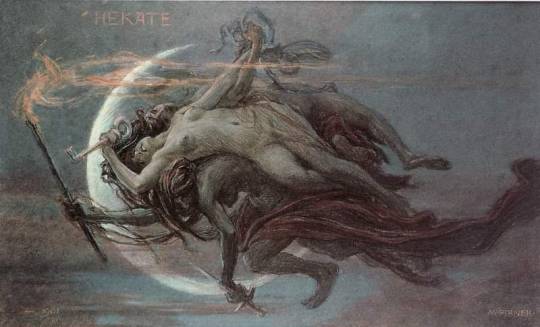
Orphic Hymn to Hekate
Author: Cory C. Childs
1. To Hekate
Incense: None
Lovely Hekate of the roads and crossroads I invoke;
In heaven, on earth, and in the sea, saffron-cloaked,
Tomb spirit, reveling in the souls of the dead,
Daughter of Perses, haunting deserted places, delighting in deer,
Nocturnal, dog-loving, monstrous queen,
Devouring wild beasts, ungirt, of repelling countenance.
You, herder of bulls, queen and mistress of the whole world,
Leader, nymph, mountain-roaming nurturer of youth, maiden,
I beseech you to come to these holy rites,
Ever with joyous heart and ever favoring the oxherd.
1. Ἑκάτης.
Εἰνοδίην Ἑκάτην κλῄιζω, τριοδῖτιν, ἐραννήν,
οὐρανίαν χθονίαν τε καὶ εἰναλίαν, κροκόπεπλον,
τυμβιδίαν, ψυχαῖς νεκύων μέτα βακχεύουσαν,
Περσείαν, φιλέρημον, ἀγαλλομένην ἐλάφοισι,
νυκτερίαν, σκυλακῖτιν, ἀμαιμάκετον βασίλειαν,
θηρόβρομον, ἄζωστον, ἀπρόσμαχον εἶδος ἔχουσαν,
ταυροπόλον, παντὸς κόσμου κληιδοῦχον ἄνασσαν,
ἡγεμόνην, νύμφην, κουροτρόφον, οὐρεσιφοῖτιν,
λισσόμενοις κούρην τελεταῖς ὁσίαισι παρεῖναι
βουκόλωι εὐμενέουσαν ἀεὶ κεχαρηότι θυμῶι.
1 note
·
View note
Text
youtube
For the New Moon in July 2023, a Hecate devotional.
Text of the Orphic Hymn to Hecate
Lovely Hecate of the roads and crossroads I invoke;
In heaven, on earth, and in the sea, saffron-cloaked,
Tomb spirit, reveling in the souls of the dead,
Daughter of Perses, haunting deserted places, delighting in dear, Nocturnal, dog-loving, monstrous queen,
Devouring wild beasts, ungirt, of repelling countenance.
You, herder of bulls, queen and mistress of the whole world,
Leader, nymph, mountain-roaming nurturer of youth, maiden,
I beseech you to come to these holy rites,
Ever with joyous heart and ever favoring the oxherd.
(translated by Apostolos N. Athanassakis)
Music: "On the Shore" Kevin MacLeod (incompetech.com) Licensed under Creative Commons: By Attribution 4.0 License
Artwork of Hecate: Medusa Dollmaker
https://www.etsy.com/de/shop/MedusaDollmaker
#orphic hymn to Hecate#Hecate#Hekate#hekatean#goddess of witches#goddess of the underworld and so much more#dark goddesses#new moon#Youtube
1 note
·
View note
Text
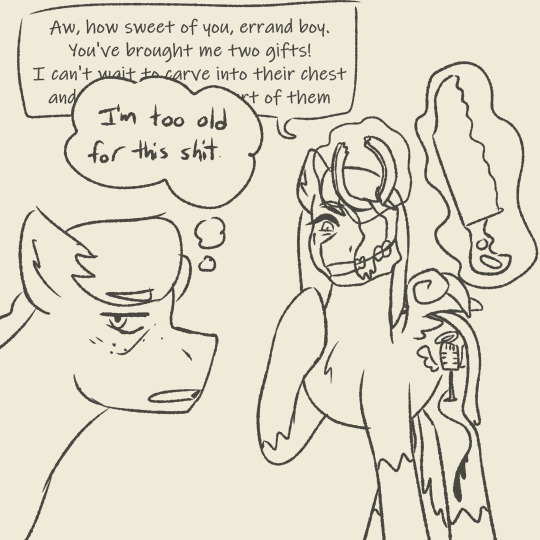


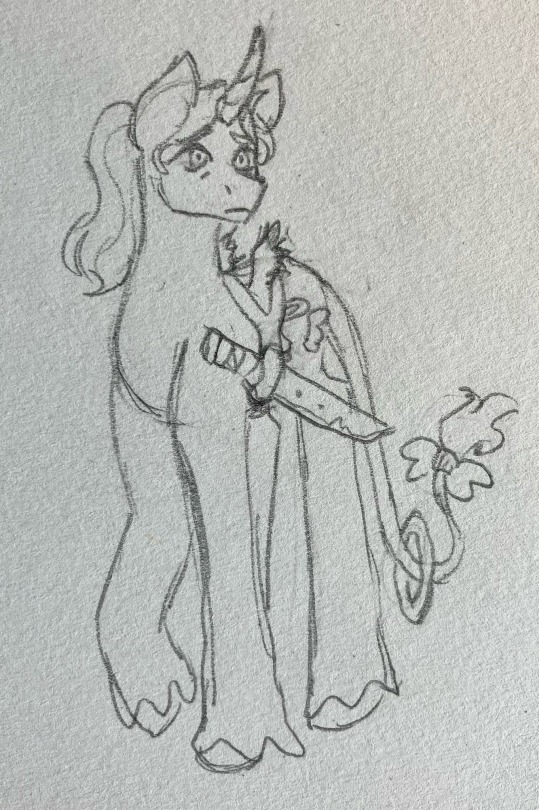
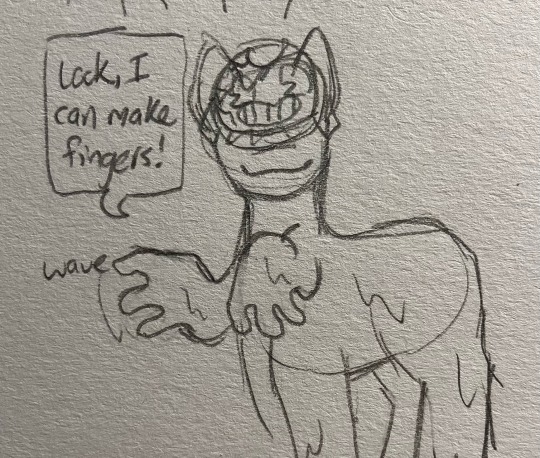



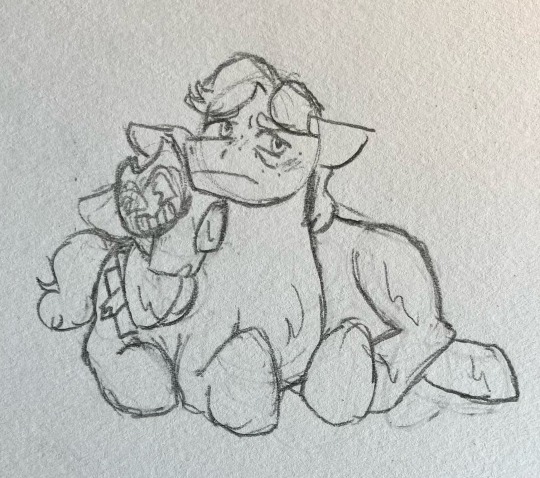

finally the angels <3 and sam, buddy, henry, and tom ig /j
#victors art#body horror#face horror#batim mlp au#bendy and the ink machine#malice angel#twisted alice#malicorn#allison angel#oh i dont have a good pony name for her#sammy lawrence#hymn herder#henry stein#sketchlines#tom the wolf
33 notes
·
View notes
Note
This would not be her first night staying in the Gerudo Fortress, but she had certainly gotten more comfortable being here. Nabooru had offered to harbor her on more than one occasion at this point, enough that she was nearly accustomed to the fortress and the Gerudo Sage’s space. From the spot where Zelda stood, she peered out the window, looking out over the desert before back to the room, the smaller details becoming more noticeable each time as she became more familiar. “Thank you, Nabooru, for allowing me to stay here once more.” A soft smile. “What was it like growing up in the desert?” She couldn’t help but to be curious, knowing the climate and way of life was much different than that of Hyrule.
It was no easy feat to convince her countrywomen to allow Zelda to walk among them at first. A common complaint about their former king had been how much time he spent in Hyrule - anti-hyrulean sentiments had cooled since he was deposed, but many were still suspicious of their neighbors. Visiting without guard helped her case, as well as Nabooru reminding disgruntled citizens that they owed reparation, and allowing the queen to visit meant she could remain with them. She deeply appreciated the latter. Nabooru never spent much time in Hyrule, and beyond the general homesickness she felt, she'd discovered she was allergic to damn near everything in the country.
Nabooru's room was spare, especially compared to her sisters. She had a woven rug spread out next to her cot, which was carved from the stone itself with a woolen mattress beneath it. The rug as well as the blanket on the cot were woven with sun motifs, and followed the rest of the room in warm orange and yellow tones. Against the wall facing the windows were two desks, or rather, one desk and one table with scrolls piled taller than Nabooru on top of it. She seemed to be able to find what she was looking for, but she was alone in that measure.
The other desk was neater, with a small hand mirror and Nabooru's makeup tabs squared in the corner. Next to it were a travel notebook, a hairbrush, a devotional book of hymns, and a small metal tin with Hylian script on the side.
Nabooru opened the box when she stepped beside the queen, spooning two lumps of dried green tea leaves into two ceramic mugs.
"Don't worry about it," she replied, closing the box and continuing the quiet ritual of making tea for company. "Makes things easier on me anyway. It's a bear trying to leave right now - the horses just started foaling and the sheep are still lambing."
It took her a minute to respond to the question, swirling the leaves in her cup thoughtfully.
"You'd get a different answer from anybody else here. My mother made me a temple attendant the second I could memorize lines."
She drank a bit, offering the other to her companion.
"A lot of it depends on what your mother does. Smiths' daughters learn the trade, along with herders, and so on. We look forward to festivals, we play games, we watch out for cliff lions. The usual."
"I'd imagine the differences start when basic training does. All able-bodied Gerudo children go through two years of military training when they're fourteen. It's self-defense, combat tactics, wilderness survival... What you need to learn to live here."
She turned to look out the window, the sun setting the horizon ablaze in pinks and orange hues that put her room to shame. She smiled to herself fondly.
"I wouldn't give it away for anything."
1 note
·
View note
Text

I am glad you all have been enjoying the Mourner, or Angerlopes as they are rightfully called by yall so far, and the implications. This one in particular is becoming a quick favorite and character.
I thought; what if the Mantelopes survived. If not all devolved further into their painful existence until they truly came nothing but the animals they've been shaped into. Instead, they climbed the agonies by pure human spite. As many of their species manage to survive evolution and become something more, the Mantelopes hobbled and fought with every inch of their being until they became one of the great superpowers in the galaxy.
With memories long sung in painful accuracies, by the remembrance of the Star People they were before and the cruel whispers of their Qu tormentors, the grazers carried on.
On their shoulders, they carried the anger and sorrows of a wronged species that may never be the same ever again. However, they refused to die. That would have been the last victory by the Eternal Enemy, the name of the Qu forever damned. With hooves that were once great fingers, they dug and pushed. Hardened nails stomping and kicking. Teeth pulling and screaming backs as they broke underweight. Crude tools are made by the physical pain of many. Try and try again.
They hacked and smashed. Into ancient pyramids and cities that have long been abandoned in a world once ruled by their Masters. These 'harmless herders'. These 'domesticated remembrancers'. A species meant to die as the last scream of a beaten species took tools left behind.
Over the ages, these stubborn herds stretched across the planet. Clans that sung their songs until they became parts of a single great voice. "We Live."
The taboo of the same fleshcraft was used over and over until limbs regained resemblance of taloned fingers. Thumbs, once thought to be vestigial, regained use. Yet, their bodies remained. The one memory is long gone. They were new people. One that sees a new dawn.
Homely caves became huts. Huts became stable-houses. Stable-houses became cities-states. Cities-states arose ships. Over millennia of a singular desire to be done by a thousand ways. A thousand vengeances cried out to each other, wars were made and alliances were forged until finally a global empire was born. The Mourners stretched from their cradle-world, occupying worlds and found scattered herds of their species. Dumb and lost, this only became kindle to their flames.
They've tried to restore sentience with their powerful technology. After several herds were resurrected to be known as the 'Forsaken', who emerged nihilistic and apathetic. With agony, the Mourners took their brothers to be labourers and recorders to the herds. Mantelopes afterwards, were put out of their misery by a long historical debate in the Council of the Imperial Choir. It is recent to the meeting of the second Human Empire have there been signs that the Forsaken was regaining emotional cognition.
With a spanning empire that had dotting jewels of restored cities and spliced technology that took after the Qu and Star People, the Mourners will become one of the most powerful among the Posthuman civilizations. Something that the Gravitals in the far future would learn with grievous consequence.
The Mourners' language is that of the Song. With vocalizations that were powerful and carried in various distances, their dialects were plentiful and each as woefully beautiful as the last that were different among the clan-herds but their bridge language is known as the 'Imperial Hymn'. Furthering it was the use of their sensory whiskers that have evolved into a further emotional expression and, some rumors - poison barbed weapons.
As militarily competent as they are, the former Mantelopes were noticeable in their affinity to artisanries. From tattoos to decored appearance, even the use of dumb robotics to further assist them in their doings.
There is more lore to think of, but I shall not smother your eyes with it all.
237 notes
·
View notes
Note
Essomenic- Sahadev, and Patration for Arjun, please?
Hi @ambidextrousarcher (I love the new url and header 💙)
Essomenic: showing things as they will be in the future
Sahadev
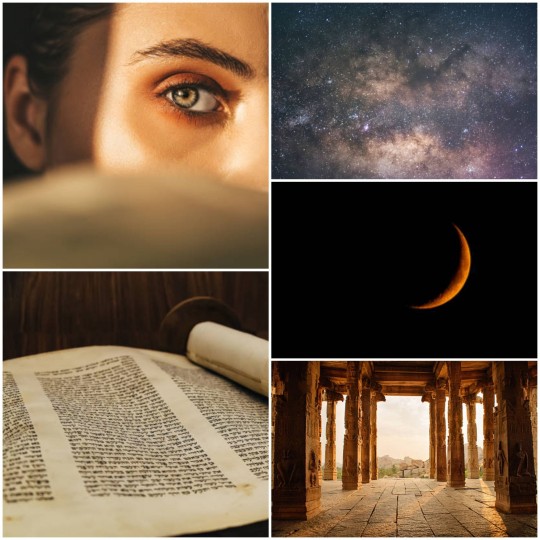
Sometimes, ignorance is bliss, its veil covers the undesirable, allows the smiles to live on for a little longer. But that luxury was not one bestowed to him in the charity of fate. Unbridled knowledge, lacking any mercy, was an inseparable share of his life now. And if it spared the ones he loved from bearing any more pain, he would choose this fate again and again, for all his lives. To see them smiling together was enough to provide him with newfound resolve. The sight of the entire Indraprastha, thriving and joyful, was the proof that many times, ignorance really was bliss. Never in his dreams he would want to shatter this beautiful, breathtaking sight, their perfect and carefree home.
He loved the sight of Panchaali laughing lightly, he treasured each one of those in his mind. She would often be puzzled by his steady glances, but still humored his behaviour. She and Bhraata Bheem would be sharing an inside joke about Bhraata Arjun, and then instantly dissolved into laughter, tears glistening in their eyes, those ones of pure joy, which he would reverently preserve in his palms, if he could. If he could, he would lock this blessed time within his heart, away from the cruelty of fates. And then his musings would be disturbed, for it would be time for Krishnaa to feed the needfuls that they welcomed as their guests, before the royal family accepted any meals for themselves. No one left her presence with any want in their hearts. No one ever will.
Their beloved Abhimanyu used to run around all of them, trying to hide from his mothers, and more often than not, he would hide his nephew in his arms. A master in evasion, he passed through the rooms as a breeze, slipping through their hands. Whenever he got a hold of his little nephew, he would show a toothy, guilty smile, one which made him weak. And the little menace knew that. The only words he could manage to whisper, inaudible to their little prince, were a request and a blessing, "may the valorous Saubhadra always remain elusive to the ones who wished him ruin, untouched from the malicious clutches of the vengeful".
Nakul used to laugh, because he would sometimes spend his free hours under the guidance of the royal herder, learning about how to attend to the large population of cattle under the ownership of the palace and how best to provide for their welfare. His twin would tremble with humorous chuckles and tease him about the absolute uselessness of this kind of knowledge for a Kshatriya prince, joking about the times when the advisor of the Samrat will have the absolute need to milk a cow. When he retorted back, about how Nakul himself was spending a bit much time in the stables, he would defend himself by explaining that a prince should have mastery in the art of horse riding, a skill too useful for a warrior. His mind reflected on the cruelty of fate, for this interest would certainly be of service to his twin, in the future that stormed nearer. He himself encouraged his brother to hone this skill of his but, on the outside, he would pout a little in return, tell him off or threaten to tell Bhraatashree about his unmannerly teasing, and their childish squabbles would continue. He relished every moment of it, he loved when Nakul complained about petty matters, because it meant that he was happy, he was comfortable, that he was still optimistic...
He buried back the immense remorse in his heart, whenever the king played a harmless game of dice, only a mere diversion from the daily duties. His family tried to distract him from his habit, but only a halfhearted attempt. When invited for a round, he would try to lead the king's mind away from that weakness of his. "Any riches of the world would turn to dirt if obtained through a mode so neglectful." he used to advise respectfully, "Only a coward would attempt to seize anything precious and worthwhile from behind the shelter of a game so trivial" always countered the Samrat, his belief immovable in all Kshatriyas always adhering to their morals. So their game would continue, and he would try to prevent his mind from wondering mirthlessly about how it would feel to be in the place of one of those bags of gold, a general possession, only on display to be gambled away...
Patration: perfection or completion of something
Arjun

Draw the string of the bow, and lose it again. The routine may feel mechanical, soulless to anyone on the sidelines, but it feels like a prayer to the one practicing. The whistling arrows are singing the hymns in his stead, the blood drawn from his hands is the sacrifice to the holy fire, every arrow finding it's mark is one cycle of chanting complete. There is no one else present in that world in which the devotee Paarth worships his gods, the bow and arrow. The center of the target beckons to him as his moksha, and as certain as an ancient sage meditating for centuries, he attains it.
His was the aim to master the art of archery, and thus Savyasachi was born into the world, the one who wields the flame-blessed Gandiva with dexterity of both his hands; the Gudakesha who lords above the constraints of sleep. His was the aim to raise Indraprastha as a part of the heavens, and so Dhananjaya was brought into existence, the winner of absolute wealths in the four directions and all the three worlds, the very one called Kiriti who graced the crown gifted by Devendra.
His was the aim to become stronger for retribution, for their tears and their scars. And for that wish, born was the warrior Jishnu, the unsurpassed, uncontrollable one who subdued his opponents, the Vijaya who defeated all in the fields of war, the one who was blessed with the feared Pashupatastra by Mahadeva. In his name-fellow Krishna's words, he was the Parantapa who scorched his enemies. But, even then he didn't relinquish the title of Vibhatsu, whether referring to the honorable one or the one who incited terror in the hearts of his foes, all the difference lied in the eyes of his beholder.
His was the aim to finish their Agyatavas successfully, so came Brihannala into creation, for achieving that target. Each movement of the teacher who taught Matsya's princess was a precise and well-crafted one, never spurred in a moment; each gesture sharper than the finest of blades, the disciplined motions preconceived even before the melodies flowed into the air, leaving the spectator entranced beyond mere words. The gracefulness mesmerized all before they could grow any suspicions. The princess adored her mentor and the prince realized all too late why he was so affected by the sways of that dancer, flaring like the fierceness of the one who was perfected by the heat of wars. When the prince was finally blessed with knowledge about their guests, it all became too clear.
All these thoughts flashed by Uttar's mind in mere moments. In his eyes, the Arjun whose charioteer he had the honour of becoming was the essence of excellence, the flawless, pure white one, the white horses of Shvetavahana's chariot being very fitting for his stature. He was standing in the presence of perfection itself and so multitudes of feelings were storming inside his mind, all names of Phalguna falling short in describing his greatness. Maybe it was his incredulous countenance, or the awe in his eyes that Arjun noticed, for he smiled at the young prince- a knowing smile. "I am just a man who wants to protect my loved ones, don't you want to protect princess Uttara, your parents and your kingdom too, Prince?" He asked good-naturedly and received a nod in reply. With kind eyes came the explanation, "So there you go, we are both not so different then. We both have somethings we cherish and want to protect, and if there are obstacles in the path we have chosen, then?" "We will best them and forge ahead?" answered the young prince hesitantly. "Exactly," encouraged Arjun "what we seek is not perfection but fulfillment of our aims, our wishes. We desire the bird's eye only, so we only follow the path that leads to it, unwaveringly, and the perfection of piercing through that target will follow in our steps as a result". Uttar smiled in response, with the resolve that one day he would surely justify the words that Arjun has said to him. That one day, he would proudly declare to the world that he and The Archer were the ideal warriors of one kind..
#lost words drabble ask#answered asks#asks#mahabharata rambles#sahdev#arjun#mahabharata#mahabharat#uttar#nakul#draupadi#bheem#yudhishthir#ask prompts
37 notes
·
View notes
Text

𝚒’𝚍 𝚔𝚎𝚎𝚙 𝚊𝚗 𝚎𝚢𝚎 𝚘𝚗 𝚝𝚑𝚎𝚖 ; that there is EMRE ALKAN , notorious for being ( restless ) and ( blunt ) , but there are times when he can be ( resourceful ) and ( cunning ) . i've heard that he could pass as a ALPEREN DUYMAZ doppelganger , but i don't see it . the ( thirty-two ) year - old male has been in town for ( three weeks ) and they are a ( true crime podcast host ) by day and murder suspect by night . they tend to spark images of ripped and faded ironic band t-shirts ( a satanic hannah montana gettup: NOBODY’S PERFECT FUCKFACE ) , drawing elaborate doodles on the back of your hand using sharpie , and wearing thick , arguably vintage headphones around your neck . you’ll know when they walk by because they always seem to be blasting hypa hypa by ESKIMO CALLBOY . it truly explains why they're known as THE MURDERINO .
hiya fellow rp addicts ! this here is emre alkan . he is trash ... but , like , he’s my trash ? anyway , down below is a little look into his history and personality .
READY ... SET ... GO !
emre alkan always connected easier with the darker side of life. when asked about it , he would shrug , sigh , and point to the pasty hue of his skin . he wasn’t meant to be out in the light . that was how people got burned .
he was the proverbial snake in the garden , charming and manipulative to an almost lethal degree . with a mysterious air surrounding him , any word uttered was presented as a gift ; one , because he had chosen to speak to you , and two , because his silence was chilling to the bone and unnerving at the best of times . and his voice ? the kind that was made to be heard . made for radio , some people would say .
though to call him goth or punk would be something of a misnomer . he was addicted to cream soda , favored the color purple , and found comfort in old weird al yankovic albums . he could quote almost every billy madison movie and he suffered from a slight case of arachnophobia . he was also asthmatic .
emre alkan was not hardcore . he just ... was .
he developed a distaste for the white picket fence life at a very young age , opting out of church in favor of smoke-filled sighs shared outside the local gas station . always craving the thrill of scary movies , horror novels , and even seedy establishments , it was no surprise when he found interest in the murder of chastity costello .
the devil was genetic , living in every member of the alkan family . his parents were two reformed outlaws who found jesus at the bottom of a vodka bottle . they would sing hymns while swatting away the sins of their children with tennis rackets and braided leather belts . they were all fighting their darker instincts , an inner contempt that wouldn’t go away .
emre hid away the bullshit with books and newspaper articles . murder after murder caught his attention and , while he was never fascinated with the concept of killing someone , he was captivated by the mystery of it all ; and for the first time , he understood why people wanted to be around him .
the idea to create a podcast was abrupt and not very well thought out . he just needed an outlet , a way to express his thoughts without losing them over time , much like he did with childhood memories or funny quips said in passing. the thought that hundreds , if not thousands of people would download it within the first weekend was ridiculous . unheard of .
100% accurate .
he hadn’t expected the podcast to be as popular as it was . desperate to escape the crazy of his family , he went and found another in the comfort of his followers , and emre couldn’t help but wonder if it was the very definition of a self-fulfilling prophecy .
leaving home was never a question of if , but when . following graduation , he used the earnings of his podcast to travel america and visit the locations of famous murders , meeting with fans and recording new episodes . years stretched on and led to more and more success . he went on tour , had two books out , and an insatiable thirst for more interesting , more gruesome stories . he was becoming restless . ravenous .
no one was surprised when he decided to visit taunwick . emre needed something big for his listeners . something new ... and why not visit the location that started everything ?
MURD HERDERS
his podcast is called the murd herd ( pronounced murdered when said quick enough ) . it is very well known , especially do to the attention taunwick received when it first began . that being said , it IS a podcast , so his face is not as recognizable as his voice is . a very h. jon benjamin type situation .
TIED TO THE MURDER:
he has researched the murders to an almost pathological degree . it could be argued that he knows as much as some of the detectives who worked on the case do . he was meticulous , wanting to give his listeners the best information he could . and his placement in town when the fourth murder occurred is certainly suspicious ( something he is entirely aware of ) .
ALIBI:
emre was in a completely different state when chastity was murdered . however , he arrived to taunwick a week before harley died . he claimed he was at the bar , but this is difficult to prove as most people don’t recognize his face . it is also difficult to prove as it was a lie . emre was actually in harley’s neighborhood , hoping to get a quote from the best friend of the deceased . they had been in contact since his arrival , so there are most likely messages between the two on her phone . people have most likely seen them together as well .
6 notes
·
View notes
Text
Epithets: Erannos
Lovely
Lovely Hekate of the roads
and of the crossroads I invoke.
In heaven, on earth,
then in the sea, saffron-cloaked
tomb spirit reveling
in the souls of the dead,
daughter of Perses, haunting deserted places,
delighting in deer,
nocturnal, dog-loving,
monstrous queen,
devouring wild beasts,
ungirt and repulsive.
Herder of bulls,
queen and mistress of the whole world,
leader, nymph,
mountain-roaming nurturer of youths,
maiden, I beseech you to come
to these holy rites,
ever with joyous heart,
ever favoring the oxherd.
-Athanassakis, The Orphic Hymns: to Hekate.
Hekate of the Path, I invoke thee, Lovely Lady of the Triple Crossroads,
Celestial, Chthonian, and Marine One, Lady of the Saffron Robe.
Sepulchral One, celebrating the Bakchic Mysteries among the Souls of the Dead,
Daughter of Perses, Lover of Solitude, rejoicing in deer.
Nocturnal One, Lady of the Dogs, invincible Queen.
She of the Cry of the Beast, Ungirt One, having an irresistible Form.
Bullherder, Keeper of the Keys of All the Universe, Mistress,
Guide, Bride, Nurturer of Youths, Mountain Wanderer.
I pray thee, Maiden, to be present at our hallowed rites of initiation,
Always bestowing Thy graciousness upon the Boukolos.
- Forrest version of the Orphic Hymn to Hekate.
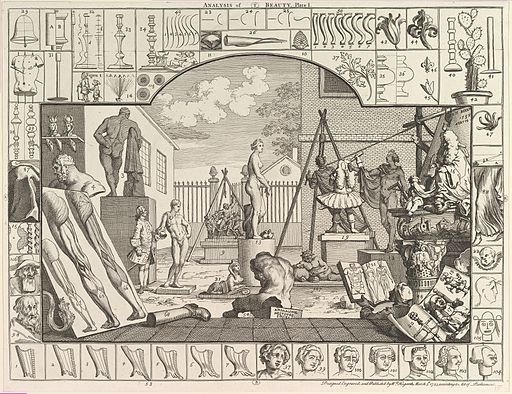
Most translations of the Orphic Hymn to Hekate vary a good bit in tone and cadence, so I have elected to share one academic understanding and one spiritualist. The Orphic Hymns were mostly written in the Roman era, and this is the clearest description of Hekate as Erannos. As a descriptor, it simply suggests that she is attractive. It seems to carry no other import, nor does it suggest Her other attributes.
At times, scholars have assumed that spirits and Gods like Hekate, particularly those who are understood to be monstrous or “dark” or associated with Death, were sometimes described as lovely, good, and kind, as a means of placating them. In this theory, the praxis was one of flattery to convince the deity to stay their wrath.
In Hekate’s case, I waver as to whether that is the case. My experiences with Her lead me to think that rather than flattery, Hekate truly is lovely when She wills it, heart-breakingly beautiful. She can also appear fearsome, but my intuition is that She is sublime and overwhelming and as lovely as the flame. Even in the forms that people describe as monstrous, I find something beautiful in Her. And in Her, I have learned to see loveliness in many things that are also “dark” or terrible.
Sources:
Athanassakis, Apostolos N. The Orphic Hymns, Johns Hopkins, 2013.
Forrest, Adam. “The Orphic Hymn to Hekate,” on the Hermetic Fellowship website: https://www.hermeticfellowship.org/OrphicHymnHekate.html
West, David R. Some cults of Greek goddesses and female daemons of Oriental origin, Butzon & Bercker, 1995.
Images:
Hogarth, William. “The Analysis of Beauty, plate 1,” etching and engraving, 1753, now in the Metropolitan Museum of Art. Via wikicommons: https://commons.wikimedia.org/wiki/File:Analysis_of_Beauty_Plate_1_by_William_Hogarth.jpg
60 notes
·
View notes
Quote
already the orchards of Death have grown heavy
with the honey of firstflowers; and the bees
have flocked to them as cattle to the herder, when
the flute is eve-a-calling —
i their mistress am singing,
a hymn for rot and all its' alms. i drink the wine
we'd barrelled for Saint Demetrios' Fire — o,
blessed is Decay, fey-fingered she who sweetens
the ripened crop once reap'd;
praises i sing her, invoking
Elysium to accompany me: and as if rousing from
deep sleep the glad dead hymn her with me,
Morpheus of the Oneiroi joining in with his pan-
flute. faintly, i hear the bees
raising their lily-trumpets —
o, such music haunts the dusked aftermath
of our mortal impermanence!
in the gardens of Death
april 15th, 2019 / / lianna schreiber
#lookaimi#useraya#spilled ink#writers on tumblr#poets on tumblr#poetry#poem#free verse#freeverse#freeform#free form#inkstain#quotidie#2019#alternate title: i miss autumn#also the fire of st. demetrios is definitely like. a thing only my region does#we just love bonfires! and drinking!
59 notes
·
View notes